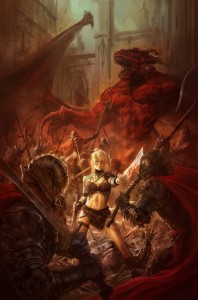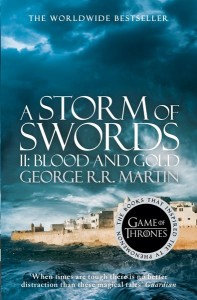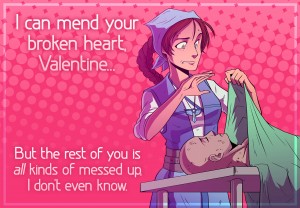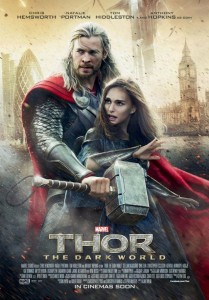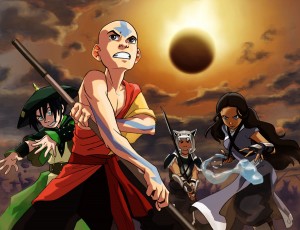Trigger Warning: This blog post discusses rape briefly.
To give you an idea of my relationship with the concept of maturity: I spent most of last weekend arguing with Peter V. Brett over the definitive function of a magical system as cast by a mysterious order of proctomancers known as Butt Wizards.
If that’s not clear enough, I mean to say I’m pretty fond of silly stuff. I don’t really buy into a lot of the traditional ideas of maturity as put forth by society today. I mean, if I did, I’d have to acknowledge fantasy and the writing thereof as a silly, frivolous endeavor and I’d likely be out of a job.
Perhaps, though, it’s inevitable that, as you get older, your priorities start changing.
Case in point.
I’m working on A Mortal Tally, the next book in the series Bring Down Heaven (more on this soon). Granted, my definition of “work” is also fairly untraditional, in that I’ve spent the last three nights sitting on a scene, trying to figure out how to make it perfect. This isn’t unusual for me, I used to do this all the time when I was working on The Aeons’ Gate trilogy, trying to figure out how just to make things happen in just the right way to make the audience enraptured.
The difference being is that back then I was working on combat scenes. Nowadays, the scenes that cause me trepidation are ones of emotional intimacy, such as sex.
The sound you just heard was a thousand readers rolling their eyes at once with such velocity as to give Harrison Ford a flashback to Raiders.
That’s to be expected, of course. Sex has traditionally had a bad reputation amongst fantasy readers. I can’t help but wonder if that’s one of the reasons I’m more interested in pursuing it, if that’s the next thing to be explored amongst a genre that has largely come to terms with excessive violence and bastardry. It’s a dialogue that interests me lately because I think we’ve been going about it the wrong way.
There are dozens of arguments against it, of course.
“It’s always written embarrassingly,” for example.
When you get down to it, sex is embarrassing. It’s a moment of extreme emotional vulnerability (usually, anyway), where both characters are at their rawest. It’s an awkward, gangly mess of limbs and exchange of fluids and grunts and everything you say is stupid but it doesn’t matter because hormones. I inwardly groan whenever anyone complains about Joe Abercrombie’s sex scenes being embarrassing because he’s writing about broken people trying to feel normal; it’s supposed to be embarrassing.
“It’s never written in an appealing manner” is another.
I think it’d be more accurate to say that it’s not written in a manner that appeals to the reader. Like anything else, from character to plot, sex scenes have a voice. It’s interesting that readers can agree with everything about a book up to a scene of emotional intimacy and then have a wildly different opinion. Did the voice of the scene change? Or does a reader’s perception just change that much?
“I’m okay with it if it’s written well.”
…you don’t say.
“It’s totally unnecessary,” though, is the big one.
And, interestingly, this is one that’s given me a lot of thought. Because for a very long time, I haven’t exactly been able to refute this.
Sex is frequently titillating, enticing, visually-arresting. In a lot of ways, it’s gratuitous by nature, since it’s something (presumably) a lot of us aren’t doing every second of waking life. Ironically, I think because of the special intimacy we attach to the act, it becomes something not often looked at in our genre and thus, seems gratuitous when we do.
For awhile, I was content to believe this.
The arguments that it didn’t add anything to the character, that it didn’t enhance the plot, that it didn’t start a conflict seemed to add up to me. The idea that it could only be there for gratuitousness was one that I felt compelled to admit had a degree of weight to it. This didn’t bother me overmuch–after all, I was fine with admitting that a lot of my combat scenes were gratuitous, as well–but there was still something about the argument that didn’t sit entirely well with me.
And it wasn’t until I was talking with my friend Jessica that it hit me.
I was ranting about a book I was reading that I had just put down because of a rape scene. It’s not that I was offended by the inclusion of the scene. Rather, I was looking ahead, deducing that, from this author’s writing style, I was about see another instance of Rape As Shorthand.
You know what I mean. You’ve probably read it yourself. A female character needs to be strong, but how do we make her strong? We can’t just have her strong. Better throw in some rape to excuse it.
As a note to writers: we should stop doing this.
So, I put the book down, as I had no real interest in seeing this trip rehashed and I went to rant to Jessica. She started wondering why, amongst all traumas, it was only rape that ever made a female character strong. Like, losing your parents and being abducted was never enough. Rape needed to be thrown in as the icing on Awful Cake.
It struck me as wildly gratuitous, but I was forced to admit that a lot of the sex scenes I wrote about were also gratuitous.
And that’s when she corrected me.
I should preface that I do not presume to speak of the effects this has on a person’s life, having never undergone it myself. I am only trying to discuss what I see being utilized in fiction time and again.
To paraphrase Jessica:
“Rape is just there. It’s in the story and there’s not a lot of ways to interpret it. Whereas consensual sex is the beginning of something more, a lot of emotions coming out and making themselves known. Fear, lust, desire, sometimes even hate. Things don’t get less complicated after you introduce those.”
And that’s when it hit me.
We had been thinking about sex entirely wrong. I had been thinking about sex entirely wrong.
You look at media today, traditional storytelling, it seems like sex is often the reward. Once the beast is slain and the couples unite, we get a sex scene. Once you do the right amount of side quests in Dragon Age, you get to have sex with Morrigan by the fire. Once everything is said and done, it’s all down to the sex.
I think I bought into this, too.
Which seems stupid, since I’ve been an ardent defender of romance in the genre by saying it’s as much a source of conflict as any dark lord. Sex is like that, an escalation of conflict, a raising of the stakes, peeling one layer of emotion off to get to something raw and bleeding underneath, something that makes everything more difficult in the story to come.
And suddenly, everything made sense.
“What about casual sex?” you might ask.
I can only really talk about what I’m doing here, but I honestly think that, because of the intimacy we attach to the act, every bit of sex has some meaning to it. There are novels out there that try to dissociate this meaning, but I think it’s inevitable that readers will attach emotion, even if the author doesn’t.
“Nonsense, I’ve read tons of stories and never felt emotional attachment,” you might say.
That’s also fine. I might argue that you haven’t found a scene yet that resonates with you on the kind of emotional level that I’d like my scenes to resonate with, but I’m hardly in the business of dictating how people should experience a book.
“I’m still not convinced and still don’t like reading sex,” you might say.
Sure. One of my dear friends, who is an avid reader of my books, is also not particularly fond of the scenes. She asks me to tell her where they are so she can skip them. I don’t take offense. They’re not for her. Since she’s a great friend of mine, I tell her and she enjoys the rest of the book just fine and I’m glad to have helped her out with that.
“Well, I don’t think I’ll read you,” you might say.
And that’s also okay.
In the end, this is only something I can do. It’s a discussion that interests me. In the future, maybe I’ll get bored of it and want to talk about the impact of feasting scenes on the reader’s psyche or something. But for right now, this subject is one I find fascinating as an emotional study and I’m interested in writing more about it.
Hopefully, you’ll enjoy reading it, when the time comes.
